Intel's P67 and H67 chipsets are set for release the
first week of 2011 in support of the much anticipated 32nm Intel 'Sandy Bridge' processor architecture
- the first to integrate a graphics core onto a multi-core CPU directly.
While many of the details of Sandy Bridge processors are known, Intel is
being tight lipped about processor and integrated graphics performance ahead of
the launch date. At Computex 2010 PCSTATS attended an Intel press conference
with multiple Sandy Bridge computer systems on display, but unfortunately these
computers only ran comparative image quality demo's. What we saw first hand
looked good, but the tests were undoubtedly skewed in favour of the graphics
core's strengths. Rumors are that Sandy Bridge's graphics core will operate at
between 650MHz and 1350MHz in turbo mode, and share some L3 cache with the four
processing cores of the CPU proper.
Sandy Bridge processors will ship in
socket 1155 Intel Core i3, Core i5 and Core i7 2xxx-series variants -
generally referenced as "2nd Generation Core family" - but will not be backwards
compatible with socket 1156 motherboards.
If history is anything to go by, the integrated graphics
of the new class of socket 1155, second generation Intel
Core i3/i5/i7 2xxx-series processors will be better
than the current Intel H55 integrated graphics chipset, but stand up like
a water pistol to a forrest fire with respect to performance tuned discrete videocards.
Integrated graphics have never competed against discrete graphics, and
likely won't for some time still. The upshot of the new graphics core
packed into the 32nm Sandy Bridge CPUs is that graphics will get
better for everyone who buys their PCs from the likes of Dell, or other
large system integrators.
The two Intel chipsets launching in conjunction with
Sandy Bridge processors are the Intel P67 and Intel
H67 .
|
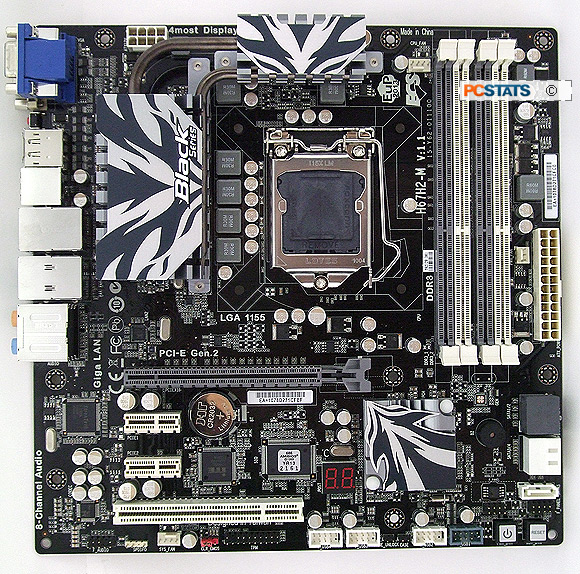
ECS H67H2-M
Motherboard
|
The Intel P67 chipset is the standard performance oriented desktop
core logic. Computers built from motherboards sporting this slab of silicon will see an incremental improvement in ports and
features over the P55 chipset, such as the addition of SATA 6Gbps support,
but will continue to get their graphics through discreet PCI Express 2.0 x16 nVidia or
AMD videocards, singularly or in CrossFire or SLI as the case may be.
The Intel H67 chipset will make use of the integrate
graphics core tucked away on the socket 1155 2nd generation Intel Core
processor. Motherboards like the ECS H67H2-M PCSTATS
is previewing for you today will not require a discrete videocard at all,
but will support up to one PCI Express 2.0 x16 videocard. Multi-monitor support via the IGP and
a range of video outputs including HDMI and Display Port come standard.
|
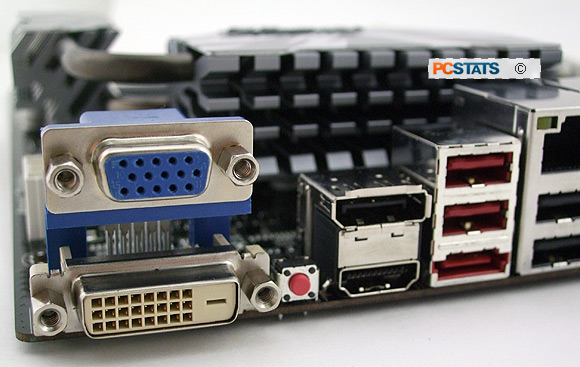
Four
onboard
video ports: DVI, Analog,
HDMI, Display Port
|
While PCSTATS cannot yet go into detail on the Sandy Bridge processor, or its graphics core performance,
we can give you a first look at one
feature packed Intel H67 board from ECS so you have a better idea
of what to expect in the new year.
PCSTATS is excited to see what the ECS H67H2-M motherboard will
be capable of with a 2nd generation Intel Core i3/i5/i7 2xxx-series CPU
installed.... but this article is going to focus on what ECS has squeezed in.
Off the top - you get four video outputs, USB 3.0, a Port 80 card, illuminated power/reset/CMOS-clear
buttons, dual slot spacing for a PCI Express 2.0
x16 videocard and all in a compact microATX format! Retail price is unknown
at this time, but expected to be $100-$130USD.
|
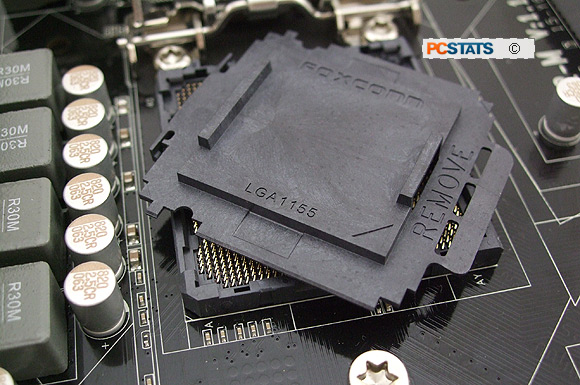
The ECS H67H2-M motherboard
is built with Japanese solid state
capacitors.
|
The ECS H67H2-M motherboard supports quad-core
Intel 2nd Generation Core i3/i5/i7 2xxx-series socket 1155 32nm Sandy
Bridge processors. The LGA1155 socket is not
compatible with existing LGA1156 processors, nor are the upcoming LGA1155 CPUs backwards compatible
with existing LGA1156 motherboards despite the common processor names.
|
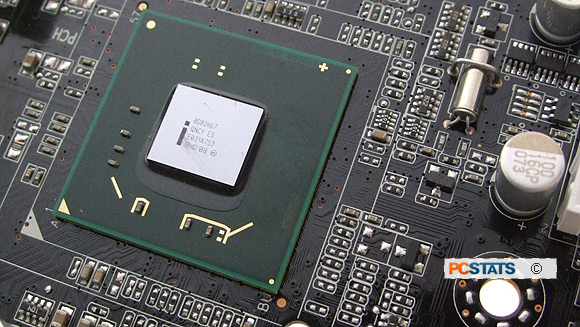
Intel H67
Northbridge chipset pictured (ES =
Engineer Sample)
|
The Northbridge is an Intel H67 chipset which
finally brings native 6Gb/s SATA III support into the house of Intel. USB 3.0 support is handled by a
discreet Etron controller on this particular bard. It may be
that Intel truly has decided to side-step native USB 3.0 support altogether and focus
on its high-bandwidth Light Peak (fiber optic) peripheral interconnect instead.
ECS' H67H2-M motherboard has one PCI Express 2.0 x16
videocard slot that runs with 16-lanes of bandwidth, two
PCI Express 2.0 x1 slots and a legacy PCI slot care
of an ITE controller. The Intel H67 has notably dropped native support for PCI.
The MicroATX ECS H67H2-M features four dual channel DDR3-1066/1333 memory slots which can accommodate
up to 4GB of DDR3 RAM in 32-bit OS', 16GB in 64-bit Windows
7.
Rounding out the feature set are
Analog/DVI/HDMI/Display Port video outputs, two USB 3.0 ports, twelve USB 2.0 ports,
one eSATA jack and a pair of
Gigabit network jacks. Intel
High Definition 8-channel audio comes standard. Two of the USB 2.0 are so-called EZ-Charger
ports which allow devices like the Apple iPad to be charged.
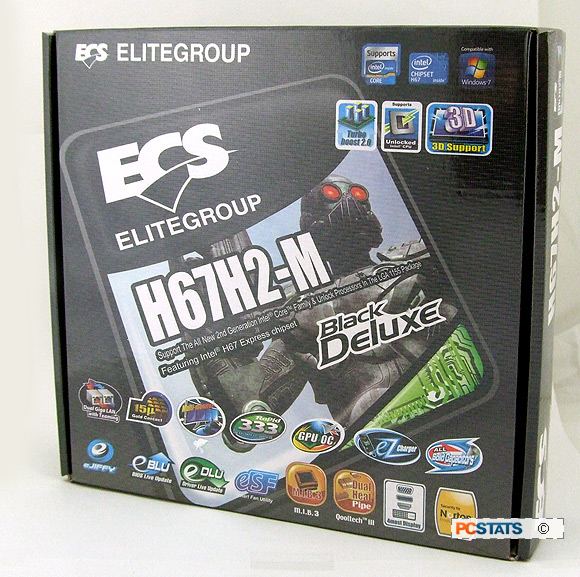
ECS has put some serious efforts into improving the build quality of
its boards, the H67H2-M utilizes Japanese made solid-state capacitors, extra-thick gold plating
on the DRAM and CPU socket pins and heatpipe cooling for the board's power MOSFETs.
Next up, detailed photos of the ECS H67H2-M motherboard and its notable features...

